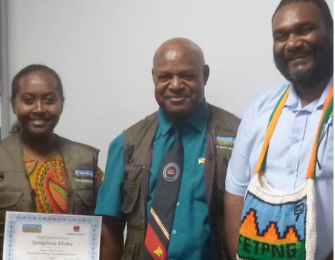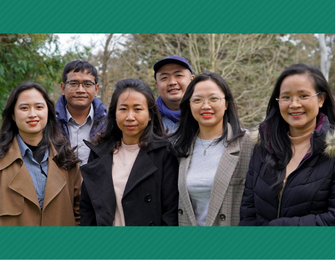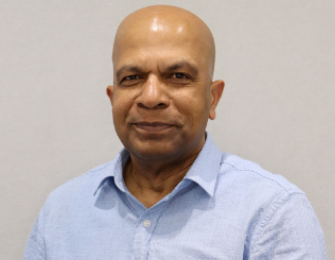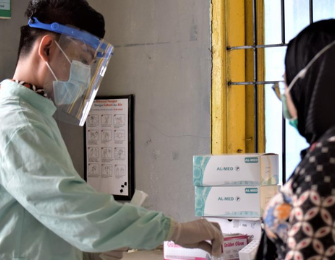Two Solomon Islanders, Cynthia Joshua and Seraphina Elisha, have now become the first fellows trained in field epidemiology, through the Field Epidemiology Training Program in Papua New Guinea’s (FETPNG).
Mentored by Australian Health Security Corps member Mica Hartley, the two fellows worked on implementing projects to improve national surveillance systems. Mica also mentored Papua New Guinean fellow, Chris Kerowa.
As the Indo-Pacific continues to build collaboration and improve regional health security, FETPNG, and the collaboration that it fosters, is an excellent example of cross-border collaboration to the benefit of both countries, and the region.

PNG Program
The FETPNG is an 8-month program, run jointly by the US Centers for Disease Control and Prevention, Papua New Guinea Department of Health and Australian Hunter New England Local Health District. FETPNG trains fellows in skills such as outbreak investigation, surveillance and public health interventions. Fellows develop a unique research project, directly related to their regular work within national ministries of health. Program mentors assist fellows for the length of their projects, from planning, developing and delivering questionnaires, collecting and analysing data, designing an implementation plan, implementing the designed interventions, and monitoring and evaluating their success.
Cynthia’s Project
Cynthia’s fellowship worked on the implementation of a rapid diagnostic test for dengue in Honiara. In 2016, Solomon Islands experienced a large outbreak on dengue which affected over 12,000 people including 15 deaths. Rapid diagnostic testing will enabler strengthened monitoring for future outbreaks, but there is a limited number of test kits in the country. The protocol determined how many tests should be completed in order to balance protecting the country from future outbreaks and managing the stock of test kits.
Seraphina’s Project
Seraphina worked to improve cause of death reporting in Solomon Islands’ largest hospital, the National Referral Hospital. Cause of death reporting was recently implemented in the Solomon Islands, allowing the first records of the national leading causes of death. Seraphina’s fellowship project will improve the quality of the data, and the speed of reporting and analysis. High-quality and timely data is essential for detecting unexpected or potentially dangerous clusters of deaths and allocating resources appropriately.
Sharing a common good
As part of her work in the Solomon Islands with the Health Security Corps, Mica helped to include Solomon Islands fellows in the PNG course for the first time, connecting Solomon Islands Ministry of Health with the program run by their Indo-Pacific neighbour. Mica has also been a lecturer and mentor on the FETPNG as part of her placement.
As Cynthia and Seraphina return to the Solomon Islands, their projects will continue when they return to work and make a permanent mark on Dengue testing and public health surveillance.
We would like to acknowledge the work of staff within AVI, WHO Solomon Islands office, Solomon Islands Ministry of Health and Medical Services, Papua New Guinea Department of Health, Hunter New England Public Health Department and US Centers for Disease Control for their contribution to this project.




